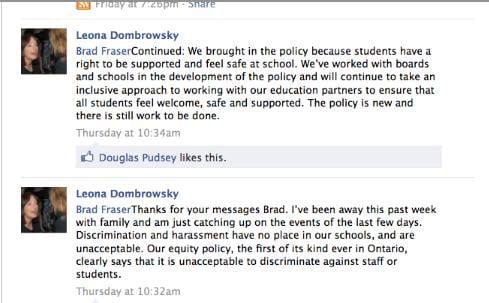
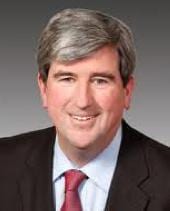
MPP Glen Murray Credit: ontarioliberal.ca
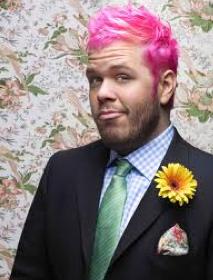
Perez Hilton Credit: ontarioliberal.ca
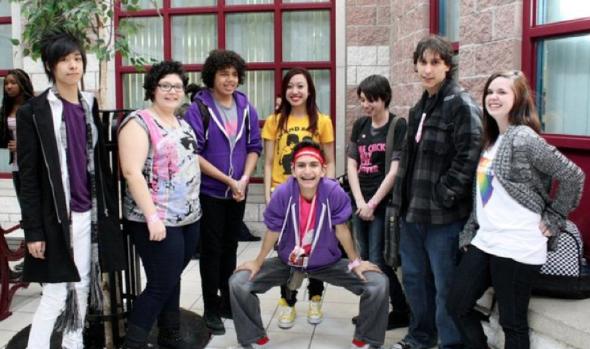
The St Joe's GSA showing their pride at school. Credit: The students at St. Joe's
The ongoing battle for gay-straight alliances (GSAs) in Ontario Catholic schools has largely been fought on social media.
For more than 80 days, I have had the Ministry of Education on speed dial, calling, sometimes daily, requesting interviews with Education Minister Leona Dombrowsky.
So far, she’s remained silent. At least to me.
Dombrowsky did comment recently on Facebook. For weeks her own wall has been papered with news stories, comments and angry questions from people demanding answers on the GSA issue and the systemic discrimination against gay, lesbian and trans students in Ontario Catholic schools. A friend request she likely now regrets accepting is the one from playwright and screenwriter Brad Fraser.
When Dombrowsky did respond, it wasn’t even on Fraser’s Facebook wall. It was on her own wall, hyperlinked to Fraser’s. She did that so only those with a friendship confirmation could comment.
Meanwhile on Twitter, MPP Glen Murray has been engaging Xtra reporters and activists for a couple of months, but he has so far been too busy for a face-to-face interview. I did manage to chase him down at Queen’s Park when Premier Dalton McGuinty made a statement in question period on March 21, but I got in only three questions before he dashed off through the front doors.
It was during one of those public Twitter debates that Murray made a comment that set the wheels in motion for the story now unfolding in Mississauga.
Triggered by a round of questioning, Murray had his back against the wall, giving activists not-so-subtle hints that human rights challenges are successful when a “real person” is connected to the issue to take it to court, as opposed to fighting a blanket ban on GSAs. The key, he told us, was finding a student being blocked from forming a GSA.
“Find a case,” he told us.
Then there’s the story of how it all began. The GSA issue would likely never have surfaced at all if it weren’t for Twitter.
Late one night back in January, on the heels of the municipal election, I came across a tweet with a link to a Lifesite News story about a new, openly gay trustee to the Halton Catholic District School Board (HCDSB).
The story was a warning to the rookie trustee that he “better not bring his gay agenda” to the HCDSB. Trustee Paul Marai promised to keep his hands off the board’s new equity and inclusive education policy, which included the now infamous ban on GSAs, a crucial point not picked up by any other media outlet. I pounced.
One of my first calls was to HCDSB chair Alice Anne LeMay, who answered at home and offered the quote that caused the story to explode on Twitter: “We don’t have Nazi groups either,” LeMay told me. “Gay-straight alliances are banned because they are not within the teachings of the Catholic Church.”
That weekend, the story lit up Twitter and Facebook. There were more than 100,000 pageviews of it on xtra.ca. It made for the most highly trafficked two days on the site, ever. It was astonishing to watch. If it were not for social media, the story would never have been picked up. Perez Hilton blogged about it, Rick Mercer mentioned it to the Toronto Sun, Dan Savage and Adamo Angelo Ruggiero retweeted it, to name just a few.
And it all happened within about 48 hours.
Fast forward to today. As you read this, St Joseph Catholic Secondary School’s Leanne Iskander, a trailblazer who is using Facebook to mobilize support, is planning her next move. Iskander’s written proposal for a GSA was posted online March 28, and by March 29 it was denied again, this time by the school board’s education director, John Kostoff, and board chair Anna Abbruscato.
Iskander’s GSA group started with 32 members and now has more than 225, and counting.
Social media is giving back the power to Iskander. She has been completely open every step of the way, and the online public has answered her calls for help. Activists, parents, allies, teachers and journalists have tweeted, retweeted and shared links on Facebook, keeping the issue in the spotlight. I’m sure that not being able to control the flow of information is particularly frustrating for politicians and Catholic school administrators who would rather have seen this issue go away, especially with a provincial election right around the corner.
In the board’s letter, Kostoff stands by the principal’s decision, saying umbrella groups are sufficient, even if they’re not what the students want. Kostoff has not returned my calls and has instead forwarded all questions to the communications department, which answers with “no comment.” This is the opposite of transparency.
Speaking of press releases and pre-written letters, on March 22 Egale Canada executive director Helen Kennedy released two statements on Facebook and Twitter. The first statement was a warning of privacy. Kennedy swore up and down to Xtra and Murray that there are Catholic schools in Ontario with GSAs, but she refused to provide the name of even one. In the statement, she claims that revealing the name of a school violates student privacy.
The other statement from Kennedy was an excellent letter to Dombrowsky. The letter represented a huge step forward, but it came very late, and Kennedy has yet to return any calls. It seems she expects media to print her quotes and not question or challenge her on the content of her statements.
This is a dangerous trend. Unlike the students, Dombrowsky, Kennedy, McGuinty and Kostoff are using social media to hide behind their computers. Why bother even having a watchdog media? Leaders — elected or otherwise — need to be accountable for their decisions and actions. Or, in the case of Catholic GSAs, their lack of action.
Read More:
- Mississauga GSA meeting hijacked by principal
- Setting policy on the backs of teens
- Halton’s new GSA ban puts Catholic school funds at risk, trustee says
- McGuinty dodges GSA question
- Politicians silent on students’ GSA bid
- Mississauga Catholic students demand GSA
- Halton Catholic schools ban gay-straight alliance groups
- Halton Catholic students may launch human rights challenge
- Gay students feel betrayed by Halton Catholic board
- Ontario Catholic School GSA story: history and documents
- GSA ban lifted by Halton Catholic school board
- Catholic bishops prohibit gay-straight alliances in Ontario schools
- Halton Catholic schools continue to ban gay student groups
- Local man tackles Catholic school board
- Leveraging public outrage
- Politicians stay silent on Catholic school GSAs
- Pastoral Guidelines to Assist Students of Same-Sex Orientation
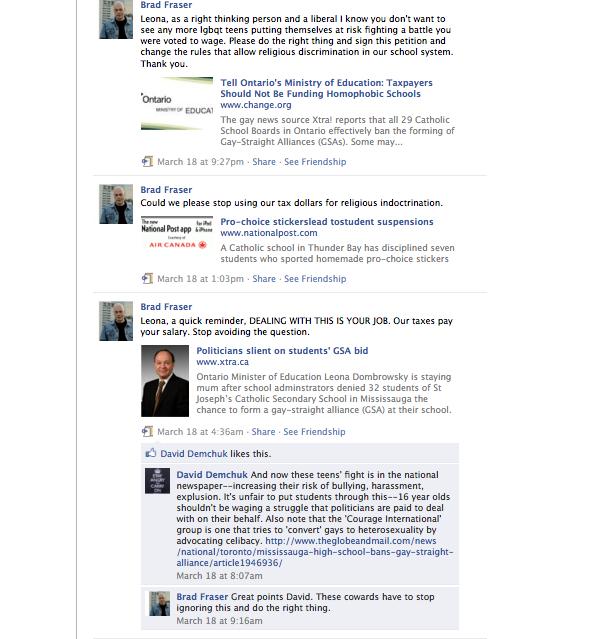
 Why you can trust Xtra
Why you can trust Xtra


